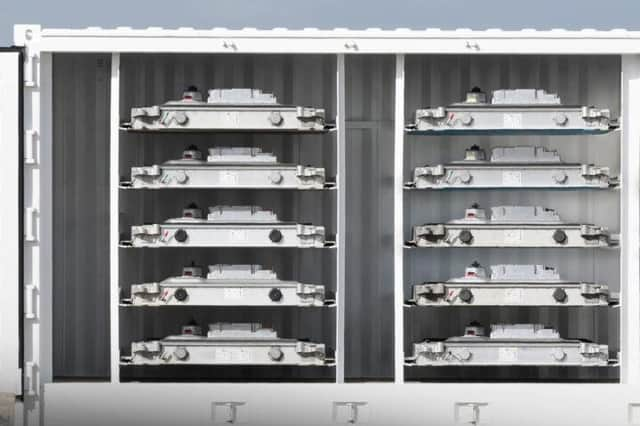Rushden firm Wykes Engineering partners with Jaguar Land Rover to develop one of UK’s largest energy storage systems in Northamptonshire – powered by old car batteries


A Rushden engineering company is to join forces with Jaguar Land Rover (JLR) to build one of the UK’s largest energy storage systems in Chelveston.
Wykes Engineering will use old batteries from JLR prototype and test vehicles to store energy across three sites at its existing solar farm on the Northants / Bedfordshire border.
Advertisement
Hide AdAdvertisement
Hide AdUsed batteries can have up to 80 per cent of their capacity remaining once they drop below the stringent electric vehicle regulations.
Each of the batteries will be removed from the I-PACE vehicles and slotted into a rack which will hold 30 batteries. Each rack is capable of storing up to 2.5MWh of energy at full capacity – enough to power 250 homes for a day.
The storage system will help decarbonise the National Grid and deal with peaks in demand and will aid JLR’s drive to achieve carbon net zero by 2039
It will take energy from the grid at low-demand times and store it, but will then be able to release it at peak times. The system will also be capable of capturing and storing energy created by solar and wind power when it is being generated to use when demand increases.
Advertisement
Hide AdAdvertisement
Hide AdJLR aims to supply enough batteries to store a total of 7.5MWh of energy – enough to power 750 homes for a day – by the end of 2023. After this point more containers can be created to house additional second-life batteries removed from used production vehicles in the future.
Second-life battery supply for stationary applications, like renewable energy storage, could exceed 200 gigawatt-hours per year by 2030, creating a global value over $30 billion.
Once the battery health falls below the required level for these second-life use cases, JLR will recycle the batteries so that raw materials can be recovered for re-use.
Wykes Engineering is based at Goosey Lodge, Wymington, and was founded by David Wykes in 1982. He still runs the flourishing firm.
Advertisement
Hide AdAdvertisement
Hide AdJLR’s executive director of strategy and sustainability François Dossa said: “Our EV batteries are engineered to the highest standards and this innovative project, in collaboration with Wykes Engineering, proves they can be safely reused for energy sector application to increase renewable energy opportunities. Using the 70-80 per cent residual capacity in EV batteries, before being recycled, demonstrates full adoption of circularity principles.”
“Working together with industry-leading partners, we are developing a complete EV ecosystem, from batteries to charging, supporting our net-zero transformation.”
Managing director of Wykes Engineering David Wykes said: “One of the major benefits of the system we’ve developed is that the containers are connected to the Grid in such a way that they can absorb solar energy ,that could otherwise be lost when the grid reaches capacity .This excess energy can now be stored in the second life I-PACE batteries and discharged later .This allows us to ‘overplant’ the solar park and maximise the amount of power we generate for the area of land we are using.”
